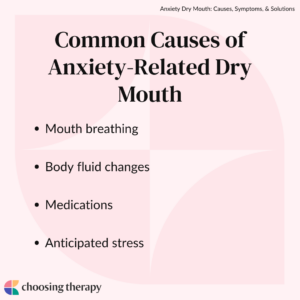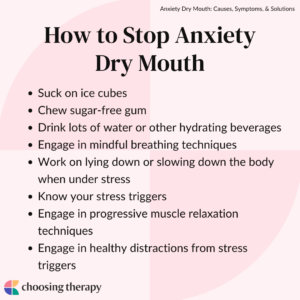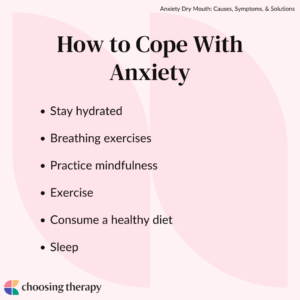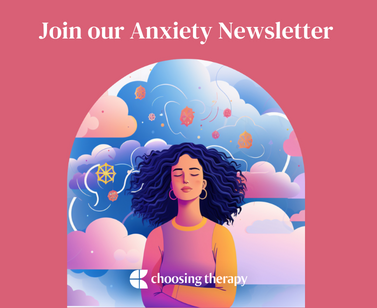Does your mouth go dry when you’re really nervous? That’s called anxiety dry mouth, and it’s more common than you might think. Dry mouth is one of the many possible physiological symptoms of anxiety resulting from the nervous system hyperarousal that often occurs in tandem with the feeling of anxiety.
Would you like to have less anxiety? Anxiety is treatable with therapy. BetterHelp has over 20,000 licensed therapists who provide convenient and affordable online therapy. BetterHelp starts at $65 per week. Take a Free Online Assessment and get matched with the right therapist for you.
What Is Anxiety Dry Mouth?
Anxiety-induced dry mouth occurs when anxiety causes hyperarousal of the nervous system. Stress and anxiety both impact the body, especially when experienced chronically. The sympathetic nervous system is a component of the autonomic nervous system which is responsible for preparing the body for emergency responses (a.k.a fight or flight state) and is often associated with the experience of anxiety.(FN1) Dry mouth can also be a side effect of anti-anxiety medications.(FN2)
Common physical symptoms of anxiety include:
- Feeling lightheaded or dizzy
- Sweaty palms
- Stomach aches
- Headaches
- Nausea
- Shaking of the hands or legs
Why Does Anxiety Give Me a Dry Throat?
Anxiety may cause dry mouth or throat because of its role in activating the autonomic nervous system into a fight or flight state. Our bodies have learned to associate certain emotions with aspects of physiological arousal.
Causes of Dry Mouth in Anxiety
When in a state of stress, the body will release stress hormones, such as cortisol and adrenaline, which cause the body to have physiological responses to stress, like a rapid heart rate, faster breathing, and increased blood sugar. When in a state of hyperarousal, one of the reactions is a dry mouth. High levels of stress have been found to be associated with higher levels of cortisol in the body, which can result in other chronic stress-related conditions such as skin conditions, gastrointestinal conditions, and heart disease.(FN3) This interaction of body responses exemplifies the crucial role stress plays in overall health and wellbeing.
Common causes of anxiety-related dry mouth include:
- Mouth breathing: Anxiety can impact the rate an individual is breathing
- Body fluid changes: The body may redirect fluids when the fight or flight response is activated, causing the mouth to dry out
- Medications: Sometimes anxiety medications can dry out the mouth, including Xanax, Valium, and Lorazepam.
- Anticipated stress: When the brain is perceiving a certain situation as stressful or potentially stressful, dry mouth is a physiologic response due to stress hormones.
Is Dry Mouth Anxiety Real or Imagined?
The nature of the relationship between anxiety and the body is complex. Sometimes our brains can have similar and non-specific responses to different types of stress, which can trigger symptoms even when there is no clear trigger for that physiological response. Sometimes it is helpful to discuss this phenomenon in therapy when it is difficult to identify the cause of physiological arousal in the body. It is also important to consult a medical doctor in order to understand if dry mouth is caused by anxiety or another underlying medical condition.
How to Stop Anxiety Dry Mouth
There are solutions and management strategies for dealing with dry mouth caused by anxiety. The treatment for dry mouth will likely depend on the cause, for example, if you take medication that causes dry mouth you may need to ask the doctor if it’s possible to adjust the dose or try a different medication. Practical solutions help to remedy dry mouth in the moment, while behavioral strategies for managing anxiety symptoms and work on calming the body and the nervous system’s response to stress are also often helpful.
Some home remedies for dry mouth include:
- Suck on ice cubes
- Chew sugar-free gum
- Drink lots of water or other hydrating beverages
- Engage in mindful breathing techniques
- Work on lying down or slowing down the body when under stress
- Know your stress triggers
- Engage in progressive muscle relaxation techniques
- Engage in healthy distractions from stress triggers
How to Cope With Anxiety
Ultimately, it is important to work on reducing anxiety symptoms with coping strategies. As mentioned previously, behavioral strategies for managing the underlying cause of dry mouth can help decrease this symptom over time if used regularly and effectively.
Options For Anxiety Treatment Talk Therapy – Get help from a licensed therapist. Betterhelp offers online therapy starting at $65 per week. Free Assessment Psychiatry for Anxiety – Looking for anxiety treatment that prioritizes you? Talkiatry can help. Find an in-network psychiatrist you can see online. Get started with our short assessment. Visit Talkiatry
Stay Hydrated
From a practical standpoint, drinking more water to prevent dehydration can help, as can chewing sugar-free gum. These strategies are simple ways to manage dry mouth if it is occurring and reduce discomfort associated with this symptom. Sometimes carrying a large water bottle around during the day can be a helpful strategy to prevent this symptom from persisting.
Breathing Exercises
As previously mentioned, breathwork can help someone reduce anxiety and possibly reduce the sensation of dry mouth caused by anxiety.
Some common breathing techniques for anxiety include:
- 333 Rule: The 333 rule for reducing anxiety can be helpful and brings an individual back into the present moment in the midst of an anxiety spiral: Simply identify or name three things in the immediate environment.
- Square breathing: Square or box breathing has been found to reduce anxiety. A person will engage in breathing while tracing a square with their finger. This also helps bring a person back into the present and out of an anxiety spiral.
- Lying down: Slowing the body or lying down when feeling stressed can help calm the nervous system.
- Give yourself a hug: Simply holding or hugging the body when stressed has been shown to help calm things down.
- Other sensory stimulation: Drinking hot or cold drinks, taking a hot bath or doing something to engage and soothe the senses can be a helpful way to decrease anxiety.
- Positive affirmations: Having some positive affirmations handy to say in order to help decrease anxiety in the moment can be helpful. One common strategy is to use the phrase, “I am safe” and repeat as much as necessary.
- Rocking: Holding and rocking the body back and forth has been found to help calm the nervous system.
- Finger tapping: Tapping the body or other objects has been found to help reduce the body’s stress response.
- Listen to music or watch a calming show: Engaging in an activity that is a healthy distraction from anxiety can be useful.
- Go for a walk: As long as the body is able to engage in some light movement, walking can be a helpful way to regulate the nervous system and also get more oxygen in the body to regulate breathing.
Practice Mindfulness
Engaging in mindfulness activities such as breathwork, meditation for anxiety, reflective journaling or yoga can help train the body to reduce the stress response over time.
Exercise
There is a positive connection between exercise and anxiety symptom reduction. Regular exercise has been found to help reduce stress levels in the body.
Consume a Healthy Diet
A healthy diet also sets the body up to be generally more healthy and energized. Focusing on foods that help anxiety can also decrease symptoms.
Sleep
Sleep hygiene is a cornerstone factor that sets someone up to have optimal health and well-being. Without regular sleep and rest, the body is more likely to be in a state of hyperarousal and distress. Most adults need 6-8 hours per sleep every night.
Anxiety-Relief Resources
There are resources to help someone manage anxiety symptoms at home that they could try in addition to their coping strategies.
Apps for Anxiety
Utilizing technology as a means to gain support around mental health concerns can be a helpful tool for managing stress and anxiety. A mental health app like Noom Mood might be an appropriate way to manage anxiety. See if your phone has any recommended apps for anxiety.
Anxiety Podcasts
Some people enjoy listening to podcasts as a way to manage their anxiety. Looking into anxiety podcasts could be a useful tool when used in combination with therapy and coping strategies. Some people also find listening to podcasts to be a soothing activity, with the added benefit that you can listen while doing other activities around the home or while commuting to and from work.
Anxiety Books
Sometimes books about anxiety can help some people learn more about anxiety disorders and how to manage their symptoms. If you enjoy reading, finding books that discuss this topic could be a helpful way to learn more about the mind/emotion/body connection. Checking out books from the library is a free and accessible way for most people to access this information.
Treatment for Anxiety
Ultimately, dry mouth caused by anxiety disorder would likely improve by treating the anxiety to reduce symptoms.
Some common treatment options for anxiety include:
- Cognitive behavior therapy: CBT for anxiety helps someone reduce dry mouth caused by anxiety through targeting thoughts and behaviors associated with anxiety for an individual.
- Dialectical behavior therapy: DBT for anxiety helps someone reduce dry mouth caused by anxiety by discussing ways to regulate difficult emotions when they arise.
- Medication: Medication for anxiety can help, although dry mouth is a side effect of some medications, so discuss this symptom with your medication provider if necessary.
- Compassion-focused therapy: Working on increasing self-compassion is one way to decrease anxiety. Compassion-focused therapy focuses on decreasing self-blame and self-criticism so you can do what you need to do to heal and relieve anxiety symptoms.
- Interpersonal therapy: Using relational methods such as those in interpersonal therapy to address anxiety can be a useful tool for deepening self-understanding and managing relationally-based anxiety triggers.
- Somatic work: Working with a specialist who provides somatic-based therapy (or body work) can be a useful way to manage anxiety.
- Trauma informed therapy: Understanding the role trauma may have in anxiety is also useful for many people struggling with chronic anxiety. Trauma-informed therapy practices focus on what happened to you rather than what’s wrong with you to help you get to the root cause of anxiety.
When to Find Professional Help for Anxiety
If symptoms associated with anxiety are causing chronic problems at work, home and in relationships with others, it would likely be helpful to find a therapist. An online therapist directory can be a helpful resource for those looking for in person or online therapy, as this method is accessible and someone can find a provider based on a directed search that addresses their needs. It is most important to find a therapist who is a good fit for you.
In My Experience
To help our readers take the next step in their mental health journey, Choosing Therapy has partnered with leaders in mental health and wellness. Choosing Therapy is compensated for marketing by the companies included below. Talk Therapy Online-Therapy.com – Get support and guidance from a licensed therapist. Online-Therapy.com provides 45 minutes weekly video sessions and unlimited text messaging with your therapist for only $64/week. Get Started Virtual Psychiatry Hims / Hers If you’re living with anxiety or depression, finding the right medication match may make all the difference. Connect with a licensed healthcare provider in just 12 – 48 hours. Explore FDA-approved treatment options and get free shipping, if prescribed. No insurance required. Get Started Anxiety Newsletter A free newsletter from Choosing Therapy for those impacted by anxiety. Get helpful tips and the latest information. Sign Up Learn Mindfulness, Meditation, & Relaxation Techniques Mindfulness.com – Change your life by practicing mindfulness. In a few minutes a day, you can start developing mindfulness and meditation skills. Free Trial Choosing Therapy Directory You can search for therapists by specialty, experience, insurance, or price, and location. Find a therapist today.Additional Resources
Online Anxiety Test A few questions from Talkiatry can help you understand your symptoms and give you a recommendation for what to do next. How Does ERP Help With Intrusive Thoughts? Obsessive compulsive disorder (OCD) is a psychiatric condition marked by the presence of obsessive thoughts, images, doubts, or urges, followed by compulsive behaviors or acts aimed at easing the distress caused by the obsession. While the content of the obsessions can take many forms, they are always repetitive, persistent, involuntary, and intrusive, and they often result in a great deal of anxiety for the person experiencing them.










